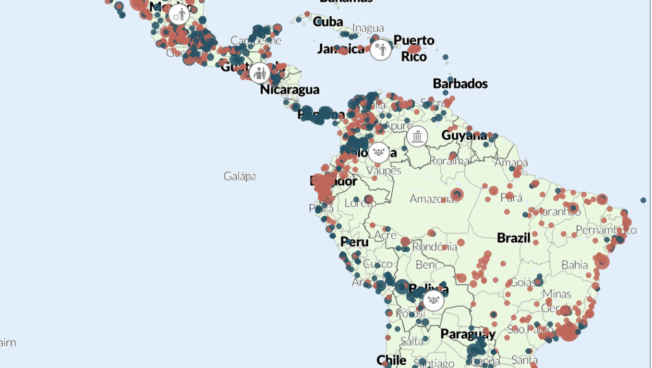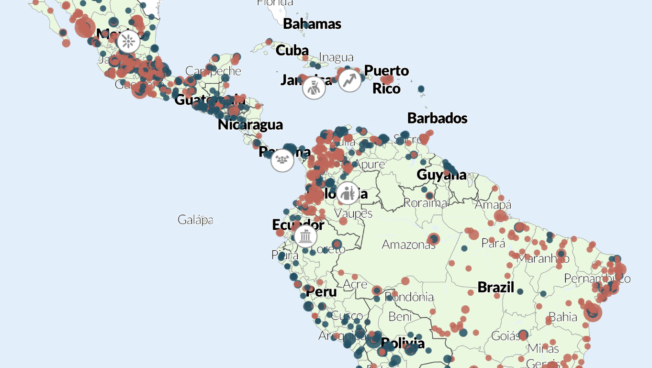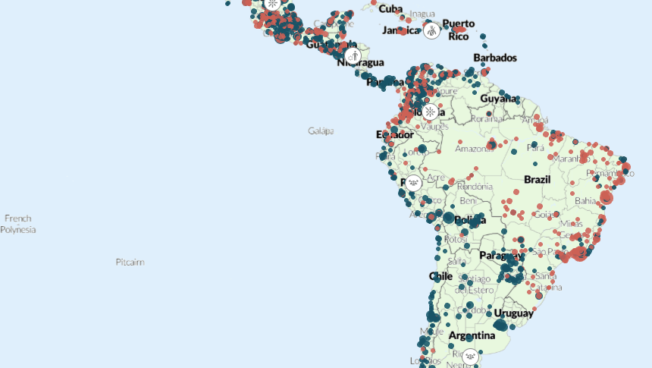Regional Overview
Latin America & the Caribbean
December 2023
Posted: 12 January 2024
 Argentina: Milei’s shock therapy sparks nationwide mobilization
Argentina: Milei’s shock therapy sparks nationwide mobilization
On 20 December, 10 days after his swearing-in as President of Argentina, Javier Milei announced a package of over 300 measures aimed at redressing the country’s economy. The proposals include the privatization of state-owned companies, as well as reforms to the labor law and the rent regulatory framework that critics denounced as endangering job security and access to housing for lower-income households. The proposals followed additional austerity measures taken a week earlier, such as a 50% devaluation of the national currency, a drastic reduction in the number of civil servants, and a cut to subsidies in the energy and transport sectors.1Elisa Villa Román, ‘Las 10 medidas económicas del Gobierno de Javier Milei para Argentina,’ El País, 12 December 2023
Milei’s announcement prompted an increase in demonstration activity in December, with events recorded in at least 15 of Argentina’s 23 provinces. Aside from a few clashes with state forces, notably in Buenos Aires and Córdoba, demonstrations were mainly peaceful. Under the leadership of Minister of Security and former presidential candidate Patricia Bullrich, the government announced a new security protocol particularly aimed at restricting roadblocks, loosening restrictions on security forces’ intervention, and creating a registry of organizations promoting protests and billing them for the cost of sending security forces to their demonstrations. While Milei’s reforms could still be blocked by either a vote in Congress, where his party does not hold the majority, or the Supreme Court, which has agreed to verify the constitutionality of the decree, demonstrations against deregulatory policies are likely to continue and could be further exacerbated by a heavy-handed state response.
 Brazil: Militia leader surrenders amid persisting gang violence in Rio de Janeiro
Brazil: Militia leader surrenders amid persisting gang violence in Rio de Janeiro
On 24 December, Luís Antônio da Silva Braga, also known as Zinho, the leader of one of the most powerful police militias in Rio de Janeiro, surrendered to the Federal Police after a week of negotiations. Zinho’s arrest comes in the midst of Operation Dynasty II, launched by federal forces to arrest militia members involved in extortion activities and tear down the financial core of the Zinho group.2O São Gonçalo, ‘GAECO/MPRJ e PF deflagram a operação Dinastia II contra a milícia, no Rio de Janeiro,’ 19 December 2023 Zinho’s militia operates in Rio de Janeiro’s West Zone and has been responsible for retaliatory waves of violence in response to state forces operations, including the burning of 35 buses in October.
The arrest of Zinho, together with the killing of potential successor Antônio Carlos dos Santos Pinto days later, has raised concerns of a power struggle within the criminal organization. A change in the militia’s power structure could further expose the group to rival criminal groups such as the Red Command and contribute to the deterioration of Rio de Janeiro’s security situation, at a time when several trends point to growing competition.3Joan Royo Gual, ‘Zinho, the most wanted militant in Rio de Janeiro who surrendered to the police on Christmas Eve,’ El País, 27 December 2023 In 2023, the Zinho police militia’s participation in clashes with other non-state armed groups nearly doubled compared to 2022, with overall non-state armed group activity also growing deadlier. Successive governments have been criticized for being unable to contain Rio de Janeiro’s public security crisis amid collusion allegations between militia groups and state police forces.4Chris Dalby, ‘Local Police Could Disrupt Attempts to Remove Militias From Rio, Brazil,’ InSight Crime, 9 November 2023 In fact, in 2023, clashes between non-state armed groups with state forces in Rio de Janeiro decreased both in intensity and frequency compared to the previous year, raising questions about the means put in place to fight criminal groups.
 Haiti: Gangs continue geographic expansion with deadly violence in the Sud department and south of Port-au-Prince
Haiti: Gangs continue geographic expansion with deadly violence in the Sud department and south of Port-au-Prince
In the Sud department, the Ti Rach gang launched an incursion to seize control of Tiburon, attacking and kidnapping dozens of civilians. The attacks prompted a clash with police forces and the killing of 17 gang members, with police claiming they dismantled the gang. Additionally, a vigilante group lynched two surviving gang leaders escaping the clash. December’s deadly events contributed to the highest number of reported fatalities recorded in Sud in 2023, amid reports that gangs are expanding to new departments, including the Artibonite and Centre, and growing concerns over deadly vigilante response and extrajudicial police killings.
Meanwhile, in the Ouest department, state forces continued anti-gang operations in the area of Mariani, Léogâne to push back gangs’ territorial expansion to the south of the Port-au-Prince metropolitan area. The spreading of gang activity to this sector has complicated the transit of goods on National Road 2, pushing residents to rely on sea routes.5TeleSUR, ‘Haiti: Gangs Force Abductees to Join Their Ranks,’ 19 December 2023 Gangs have also increasingly used maritime routes to avoid law enforcement and rival gangs. Notably, on 10 December, five members of the 5 Seconds gang died in a clash with law enforcement officers off the coast of Mariani, and on 20 December, police seized a yacht belonging to the gang.
 Jamaica: State of emergency and curfews fail to curb gang violence
Jamaica: State of emergency and curfews fail to curb gang violence
Gang feuds continue to drive high levels of violence in Jamaica, prompting the government to extend state of emergency measures and order curfews in several parishes in December, including Saint Andrew, Westmoreland, Saint James, Hanover, and Saint Elizabeth. In Saint Catherine, police conducted anti-gang operations, resulting in the arrest of 13 alleged members of the Clansman gang, which has fought against rival factions for the control of Spanish Town. The operation follows an increase in armed attacks in Saint Catherine in September. Elsewhere, in Westmoreland, violence involving gangs increased in December compared to the previous month, even after a state of emergency decree in the parish on 8 November. Despite police claiming to have dismantled criminal structures in this parish in 2022, gang violence continued unabated in 2023. Police highlighted that gangs have adapted their movement and used secondary roads to bypass law enforcement operations. Since 2019, ACLED records a progressive increase in gang-related violence in the country, with double the clashes between non-state armed groups and a 12% increase in violence targeting civilians involving gangs between 2022 and 2023. Critics have said that the implementation of successive state of emergency measures has led to state forces’ abuses of power while doing little to curb gang activities.6Kate Chappell and Brian Ellsworth, ‘Jamaica declares regional states of emergency due to gang violence,’ Reuters, 15 November 2022; Sandrine McDuff, ‘Hundreds In, Hundreds Out: Jamaica’s Inefficient Response to Violent Crime,’ InSight Crime, 19 July 2019
 Mexico: Ongoing turf wars drive surging violence in the Tierra Caliente region
Mexico: Ongoing turf wars drive surging violence in the Tierra Caliente region
On 8 December, farmers attacked and killed 10 members of La Familia Michoacana during a meeting in Texcaltitlán municipality, Mexico state, in response to the criminal group’s announcement of an extortion fee increase.7Beatriz Guillén,’ Muerte en un campo de fútbol: Texcaltitlán y su última masacre anunciada,’ El País, 12 December 2023 The cartel retaliated by kidnapping at least 14 local residents.8Associated Press, ‘Mexico says a drug cartel kidnapped 14 people from towns where angry residents killed 10 gunmen,’ 28 December 2023 La Familia Michoacana extorts local farmers and businesses in Mexico and Guerrero states, particularly in municipalities in the Tierra Caliente region, including Texcaltitlán.9C. González, ‘Familia Michoacana cobra piso en 4 estados; extorsión y control de precios hacen metástasis en 56 municipios,’ Excelsior, 11 December 2023 In 2023, La Familia Michoacana increased its activity in Guerrero and Mexico states to gain control over extortion markets and conducted violent incursions against local criminal groups such as Los Tlacos.10Karla Alva, ‘Familia Michoacana vs Tlacos: el infierno que vive Guerrero gobernado por Evelyn Salgado,’ La Silla Rota, 8 January 2024; Miguel Flores, ‘¿Subió el precio del pollo en Toluca por culpa de La Familia Michoacana? Esto sabemos sobre las presuntas extorsiones a polleros,’ Infobae, 5 January 2024 Notably, this warfare contributed to a 29% increase in violence in Guerrero in 2023 compared to the prior year.
Elsewhere in the Tierra Caliente region, clashes between the Jalisco New Generation Cartel (CJNG) and members of the United Cartels in Buenavista and Tepalcatepec municipalities drove an increase in violence in Michoacán state in December relative to the month prior. Competition between criminal groups has crystallized in the Tierra Caliente region for its strategic location along drug trafficking routes. Organized crime groups have also diversified their revenue-generating strategies in the area, including extortion, and taking control of lucrative avocado and lime production. In 2023, clashes between non-state armed groups in the Tierra Caliente region accounted for 8% of non-state armed group clashes in the country.
 Venezuela/Guyana: Tensions rise after a referendum on the Essequibo region
Venezuela/Guyana: Tensions rise after a referendum on the Essequibo region
On 3 December, Venezuelans voted in favor of annexing the Guayana Esequiba, an oil-rich region disputed since the 19th century with neighboring Guyana. Following the vote, President Nicolás Maduro announced a series of measures, including the creation of a Guayana Esequiba state and a related Integral Defense Zone and granted authorization to the state-owned oil company Petróleos de Venezuela (PDVSA) to manage oil and gas operations there.11Irene Sarabua M., ‘Maduro anuncia plan para el territorio Esequibo: incluye nueva Zodi e inicio de operaciones de Pdvsa,’ Efecto Cocuyo, 5 December 2023 Amid fears of a military escalation, Guyana and Venezuela signed the Joint Declaration for Dialogue and Peace on 14 December and committed to refraining from using force against one another.12Barbados Ministry of Foreign Affairs and Foreign Trade, ‘The Joint Declaration Of Argyle For Dialogue And Peace Between Guyana And Venezuela,’ 14 December 2023 The United Kingdom’s deployment of a naval ship to Guyana in a show of diplomatic support in late December fueled additional tensions, with Maduro retaliating by ordering 5,600 soldiers to carry out military exercises on the eastern coast. Tensions are likely to remain high ahead of Venezuela’s presidential elections, expected in late 2024 but still without a fixed date. Despite a low referendum turnout, many expect Maduro to make the Essequibo status his main campaign argument in a bid to strengthen national cohesion, boost his waning popularity, and crack down on dissent.
See More
See the Codebook and the User Guide for an overview of ACLED’s core methodology. For additional documentation, check the Resource Library. Region-specific methodology briefs can be accessed below.
Links:







